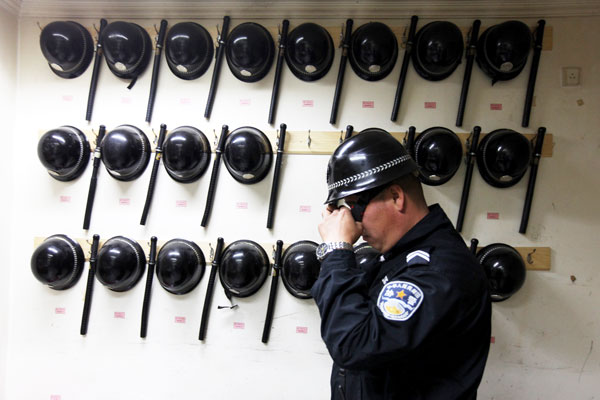

 |
|
Security personnel equipped with protective equipment, including stab-proof vests, gloves and tear gas, have begun patrols at Taizhou Municipal Hospital in Zhejiang province. Provided to China Daily |
Police in Taizhou, Zhejiang province, have started patrols at hospitals in the city to ensure the safety of medical staff and to maintain order.
The patrols follow increased doctor-patient disputes that include a doctor in the city being fatally stabbed by a disgruntled patient in October.
Taizhou Municipal Hospital is the first one where police officers and security equipment have been stationed.
Three police officers are assigned per 100 medical staff and security guards at the hospital are equipped with stab-proof vests and gloves and tear gas in case of emergencies, said Xu Guocai, deputy director of the Jiaojiang district police department in Taizhou.
"The police officers, security guards and equipment are managed by a police station inside the hospital. The officers and guards will be trained together and the station will also keep a close watch on medical disputes that occur in the hospital," Xu said.
The department will also help the hospital to install monitoring and emergency alarm systems in key areas, including the emergency room and intensive care units, where disputes are most likely to occur, he added.
"Taizhou Municipal Hospital is a testing hospital for the program. We will continue establishing such police stations in other hospitals in the city as soon as possible," Xu said.
Wang Yunjie, 46, a chief physician in the ear, nose and throat department at First People's Hospital of Wenling, a county-level city in Taizhou, was fatally stabbed on Oct 25.
Police say the attacker was an unhappy patient at the hospital, Lian Enqing, who also injured two other doctors in the attack.
Wang's death triggered sit-ins by medical workers in Zhejiang province and in neighboring Shanghai, who called for safer working environments and a more caring attitude toward them.
Zhang Richu, deputy director of Taizhou Municipal Hospital, said additional police support at the hospital will help medical staff focus on their work.
"When our doctors feel safer in the hospital, they will be more willing to take responsibility," he said.
"After the incident in Wenling, some of our doctors became very nervous in their work. They were afraid to make decisions, especially significant ones, because they feared their decisions could cost them their lives. As a result, patients could not receive proper treatment."
Ruan Jianwei, an orthopedic doctor at Taizhou Municipal Hospital, welcomes the police presence.
"How can we save people's lives when our own security is under threat? I think the security efforts are necessary," Ruan said.
Zhang said the hospital will continue to hire more security guards. "Of course, a safer hospital also provides a better environment for the patients," he said.
However, some patients do not think heavy security in hospitals will help to end doctor-patient disputes.
Ding Hui, a patient at the Taizhou hospital, said: "Many doctors today lack ethics. They do not care, or at least act as if they do not care about your problems, while consistently prescribing expensive medicines. That is the reason why patients are angry with doctors."
Ding said she paid more than 500 yuan ($82) for medicines for her son at the hospital, but he only had a cold.
"Having police officers in hospitals can only stop some violence from happening or minimize the damage, but it cannot satisfy patients if doctors do not change their ways," she said.
A survey by China Youth Daily published in November found that 66.8 percent of more than 250,000 participants said they do not trust doctors' diagnosis and treatment.
Of these, 26 percent thought the nation's healthcare system should be improved, while 21 percent said that money plays a more important role in current doctor-patient relationships.
The average number of assaults on doctors per hospital increased from 20.6 in 2008 to 27.3 in 2012, according to a survey by the Chinese Hospital Association, which polled staff and patients at 316 hospitals nationwide.
yanyiqi@chinadaily.com.cn